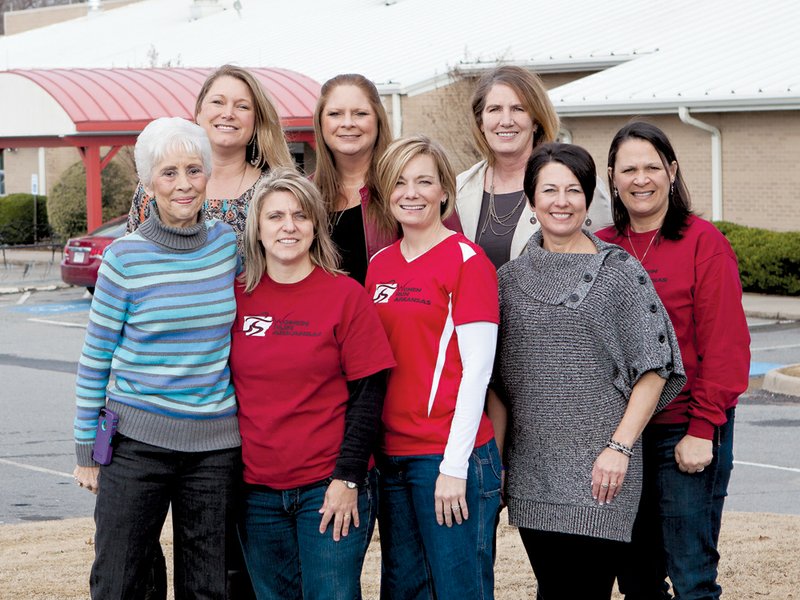Tambra Clement has a message for women: Almost all of you can be runners.
Clement, 50, of Faulkner County is the new statewide coordinator for the 16th Women Run Arkansas running and walking clinics, which will begin the week of March 4 and culminate after 10 weeks in the Women Can Run/Walk 5K in Conway on May 11.
“A lot of women say, ‘I’m not a real runner,’ but you are,” Clement said. “What I liked about it was the method that we teach. It builds you up and allows you to walk. It’s a run-walk method, and at the end of the day, unless someone has some real physical limitations, everyone can do it.”
Clement, who lives between Conway and Vilonia and works in human resources at Acxiom, first became involved in WRA at age 45. She hadn’t been a runner; neither was her husband, Ken, nor their children.
Five years ago, she and her son Keith, then 12, did a co-ed clinic in the fall through The Sporty Runner in Conway. Linda Starr, store owner, was then the statewide coordinator of WRA.
“I kept on doing it; he didn’t,” Clement said. “I rolled right over from that to the Women Run Arkansas clinic in the spring. Linda had been involved from the beginning.”
Clement found that the clinics helped her by providing a plan.
“I had tried on my own, but I would try to run three miles. I didn’t know about run-walk,” she said. “You just have to build it up. The most important thing was meeting other women with similar interests, and you start finding yourself with them outside the clinic, going to races together, and the next thing you know, it’s five years later.”
And Clement has now replaced Starr as statewide coordinator.
Since Clement’s beginning five years ago, she has run three full marathons, 15 half marathons and one 10K.
“I like the half because it’s very doable from a training perspective, and you can still enjoy it,” she said. “A full is just hard on you. 5Ks are good, but once you become a long-distance runner, you learn that the first three miles are the hardest, and once you get past those, it becomes easier.”
She runs year-round and finds the hardest time to do so is during the hot Arkansas summers.
“Winter is not that bad,” she said. “If it’s 30 degrees, it’s perfect weather to run. Now when you get down in the 20s and teens, it’s harder. In the summer, we do a lot more walking because of the heat.”
She called WRA a life-changer. Elaine Doll-Dunn, 75, of South Dakota has been the speaker at the pre-race pasta party twice. She preaches that women who begin running after turning 40 believe they can do anything, and she has proven it: Doll-Dunn ran her first marathon at 41; survived a divorce at 51; beat cancer at 56; climbed Mount Kilimanjaro and won a marathon there at 58; ran 60 miles across Panama, from the Atlantic to the Pacific Ocean, at 60; completed 26.2 marathons at 62; and earned a Doctor of Philosophy degree in psychology at 65.
She was the guest speaker and starter at last year’s Arkansas race.
“The first time she was here, I was trying to decide if I was going to do a full marathon, and I remember thinking, ‘If a 62-year-old can do 26 in one year, then a 46-year-old can do one,’” Clement said. “Once you set that goal and you start working toward it and you do it — now a week doesn’t go by that I may be faced with a very challenging situation that I tell myself, ‘If I can run a marathon, I can do anything.’
“It’s a matter of putting your mind to it and being disciplined and training. Technically, anybody can do it if they’re physically capable. It helps your perseverance and trying to get through difficult situations.
“You realize there’s not much you can’t do,” she said.
At press time, 42 clinics were scheduled at locations across the state.
“Last year we had 5,099 women registered for the clinics, and about 2,050 finished the race. A lot of women start [the clinics] and don’t finish, but we try to encourage them, if they miss one or two sessions, to come back.”
The free clinics generally meet twice a week with participants expected to work out a third time on their own. According to www.womenrunarkansas.net, the clinics are
designed to meet the needs of all ability levels. Beginners can go from sedentary to 3.1 miles, and intermediate and advanced runners have programs with specific training goals to increase their speed.
Online registration, as well as more information about the clinics and the 5K, is available at www.womenrunarkansas.net.
“I knew when Jan. 1 came, we needed to be ready,” Clement said. “Once you’re committed, you’re more likely to do it. We encourage people to register online, but there will be on-site registration for those who prefer that.”
The cost for the race is $20. Clinic participation is not a prerequisite.
“We try to encourage the women in the clinics to go ahead and register to have a goal,” Clement said. “If you go to the Conway clinic, you may see 200 women there the first night, and the last night, you might see 75. Some want to come back every year and then eventually become leaders.”
Clement said the race is inspirational, with many previously sedentary women completing their first 5K cheered by friends, family members and fellow participants. Two years ago, an 87-year-old woman from Lonoke completed the clinic and finished the race. Mothers and daughters can participate together.
“There’s a lot of stories like that,” Clement said. “I encourage any women — just come. They’re apprehensive, but if they’d just come, they’d realize not everybody’s eyes are on them. They learn it’s OK to walk.
“It’s just amazing to see,” she said.
